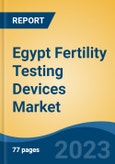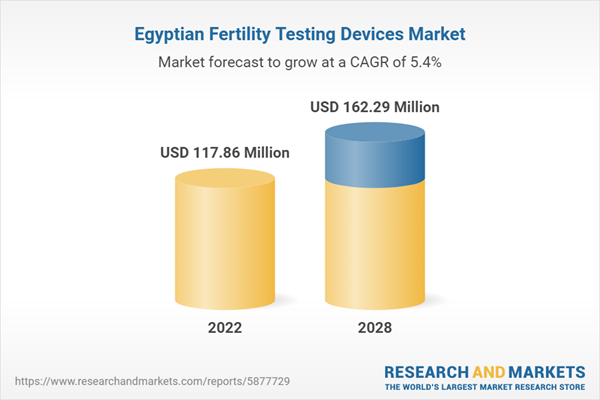Speak directly to the analyst to clarify any post sales queries you may have.
10% Free customizationThis report comes with 10% free customization, enabling you to add data that meets your specific business needs.
Fertility testing devices are medical tools used to assess a woman's fertility potential. These devices are designed to measure various parameters such as hormones, temperature, and cervical mucus, which can indicate a woman's ovulation status and overall reproductive health.
In Egypt, the increasing awareness and acceptance of fertility testing among couples are contributing significantly to the market's growth. According to the latest United Nations data, Egypt's current population stands at 107,687,132, making it the most populous country in the Arab Region and the 14th globally. By 2021, the population had already exceeded 102 million inhabitants, projected to grow at an annual rate of 2%. With this growth rate, Egypt's population is expected to reach 180 million by 2052, positioning the country among the world's top nine most populous nations.
A variety of fertility testing devices are available on the market. Some common examples include blood tests, fertility monitors, ovulation predictor kits, and cervical mucus monitoring. For instance, ovulation predictor kits (OPKs) are handheld devices that measure the level of luteinizing hormone (LH) in a woman's urine. LH surges just before ovulation, signaling the release of an egg. OPKs are user-friendly and help women identify their most fertile days.
Cervical mucus monitoring is another method, where the quality and quantity of cervical mucus indicate a woman's fertility status. During ovulation, the mucus becomes thin and stretchy, similar to raw egg whites. Tracking changes in cervical mucus enables women to identify their most fertile period. Fertility monitors are electronic tools that track various fertility parameters, including LH, estrogen, progesterone levels, basal body temperature, and cervical mucus. These devices offer a comprehensive view of a woman's fertility potential and aid in detecting any underlying fertility problems.
Blood tests are also utilized to measure hormone levels such as follicle-stimulating hormone (FSH), which indicates a woman's ovarian reserve or the number of eggs remaining in her ovaries. Blood tests can also measure other hormones like estradiol, progesterone, and testosterone, helping diagnose hormonal imbalances affecting fertility. The availability of these diverse testing devices is influencing Egypt's fertility testing devices market.
Increasing Awareness and Acceptance of Fertility Testing
There is a growing awareness and acceptance of fertility testing among women and couples, driven by factors like delayed childbearing, rising infertility rates, and a desire for proactive family planning. Fertility testing helps couples identify fertility issues early, leading to prompt treatment and better outcomes. Early detection also aids couples in informed family planning and reproductive health decisions.Infertility can cause stress and anxiety for couples trying to conceive. Fertility testing provides reassurance that all is well or identifies the cause of infertility, alleviating stress and anxiety. Informed family planning decisions, such as when to start trying to conceive and whether to pursue fertility treatment, are supported by fertility testing. This helps couples achieve desired family size and spacing, with long-term benefits for family health and well-being.
Economically, fertility testing has benefits for individuals and society. Detecting fertility issues early helps couples avoid costs related to infertility treatments like in vitro fertilization (IVF). Reducing infertility rates can lower healthcare expenses and increase acceptance of in-vitro fertilization among infertile couples or those with serious health concerns potentially leading to infertility.
Growing Demand for Non-Invasive and Convenient Fertility Testing
Women seek non-invasive and convenient fertility testing methods that can be conducted at home, such as ovulation predictor kits, fertility monitors, and at-home hormone testing kits. This demand is fueled by increased awareness of fertility issues, rising prevalence of reproductive disorders, and the desire to control reproductive health.Traditional fertility testing methods involved invasive procedures such as blood tests, ultrasounds, and biopsies. Although accurate, these methods are often uncomfortable and inconvenient, requiring multiple visits to healthcare providers. Some individuals might be hesitant or embarrassed to undergo these procedures.
Recent years have seen the emergence of non-invasive fertility testing methods. One method involves saliva testing, where a small sample is analyzed for hormone levels indicating fertility status. Painless and convenient, this method is done privately at home. Other non-invasive methods include urine testing and home fertility monitoring devices that track basal body temperature and other physiological markers. Convenient fertility testing is especially important for individuals and couples trying to conceive, enabling them to track fertility status over time and detect potential issues early. It's also useful for those not actively trying to conceive but interested in understanding reproductive health and planning.
Government Initiatives and Support
Fertility testing devices and services are essential aspects of reproductive healthcare in Egypt, prompting the government to implement initiatives and support programs for increased access and improved quality. The National Population Strategy, launched in 2015, focuses on family planning and reproductive health. It emphasizes increasing access to fertility testing and counseling services, particularly in underserved areas. The government raises awareness through campaigns about the importance of fertility testing and family planning. The Ministry of Health and Population enhances the quality and availability of fertility testing services by training healthcare providers and ensuring clinics and hospitals have required equipment.Public-private partnerships are established to boost fertility testing access. For example, the National Population Council partners with private companies to provide free or low-cost fertility testing to women in rural areas with limited healthcare access. Regulatory efforts ensure providers adhere to standards and guidelines. The Ministry of Health and Population monitors fertility testing clinics to ensure quality standards and accurate information to patients.
Government initiatives support fertility testing and treatment, funding infertility research, improving fertility service access, and promoting awareness about infertility's impact on families. This boosts the fertility testing devices market's growth.
Market Segmentation
The Egypt Fertility Testing Devices market can be segmented by product type, application, mode of purchase, end user, and region. Based on product type, the market is segmented into ovulation-prediction kits, fertility monitors (urine-based ovulation tests, saliva-based ovulation tests), and male fertility testing products. Based on application, the market is segmented into female fertility testing and male fertility testing. Mode of purchase includes OTC and prescription-based. End user categories are hospitals, fertility clinics, and home care settings.Market Players
Key players in the market include Roche Diagnostics, Clearblue, Fairhaven Health, AdvaCare Pharma, Zimmer Biomet, Conmed Corporation, Boston Scientific, GE Healthcare, and others.Report Scope
This report covers the Egypt Fertility Testing Devices Market in 2028, segmented into various categories including product type, application, mode of purchase, end user, and region. It provides detailed analysis of the major companies operating in the market.Available Customizations
The analyst offers customizations according to a company's specific needs with the provided market data. Options include detailed analysis and profiling of additional market players (up to five).This product will be delivered within 1-3 business days.
Table of Contents
Companies Mentioned
- Roche Diagnostics
- Clearblue
- Fairhaven Health
- AdvaCare Pharma
- Zimmer Biomet
- Conmed Corporation
- Boston Scientific
- GE Healthcare
Table Information
| Report Attribute | Details |
|---|---|
| No. of Pages | 77 |
| Published | August 2023 |
| Forecast Period | 2022 - 2028 |
| Estimated Market Value ( USD | $ 117.86 Million |
| Forecasted Market Value ( USD | $ 162.29 Million |
| Compound Annual Growth Rate | 5.3% |
| Regions Covered | Egypt |
| No. of Companies Mentioned | 8 |









